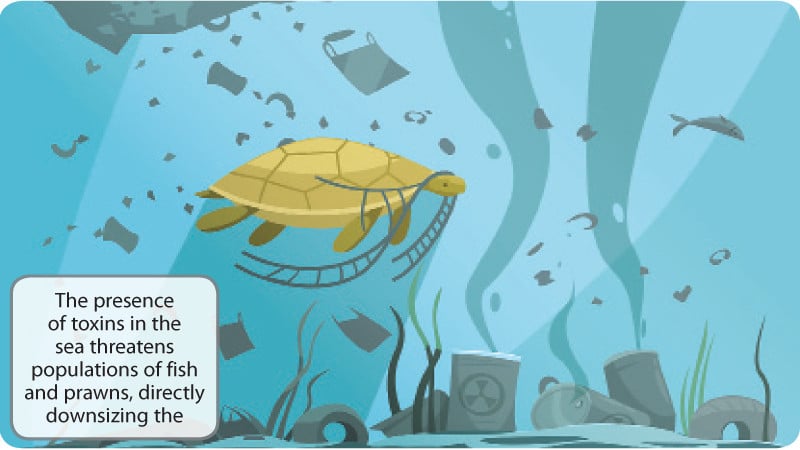
Although the ocean possesses the surreal characteristic of sweeping and engulfing nearly anything it comes into contact with on the shore, unlike land and air, the sea has no apparent mechanism of signaling the overflow of toxins therefore, the repercussions of the delay in completion of the Combined Effluent Treatment Plant (CETP) in the port city, can only be assessed by the degree of harm facing marine life.
According to Dr Sher Khan, Assistant Professor at the Centre of Excellence in Marine Biology at the University of Karachi, the findings of a comprehensive study carried out on the coastlines of Manora Channel, Sonmiani, Korangi Creek and Bhanbhor Creek have identified the presence of high concentrations of hydrogen sulfide, which not only poses a serious threat to the life of marine organisms, but also to the people living around these coastal areas, who are at risk of acquiring respiratory ailments and skin diseases.
“The sea has become a dumping site for the city’s domestic sewage and industrial waste. There was once a time when the coastline was so clean that fish were seen floating but now the coastal belt has become completely black due to waste accumulation,” alerted Kamal Shah, spokesperson for the Coastal Media Centre.
Read Cats, rats, invasive flora imperil Pakistan’s only marine protected island
Recognizing the need for waste treatment, in 2010 the Sindh Industrial Trading Estate (S.I.T.E) had announced the Combined Effluent Treatment Plant (CETP) with the aim of forestalling the exacerbation of sea pollution and protecting the population of aquatic life.
Even though the project was supposed to commence by 2018, five years have passed since and the project is far from reaching its desired goal of eliminating industrial waste from the ocean, as consistent delays in the release of funds alongside a recent transfer of finances to a public-private partnership have only complicated the urgent need for safeguarding populations of marine creatures.
“Given the delay in the project, a few days ago, the Chief Minister of Sindh instructed that CETP should be transferred to the Public Private Partnership wing of the Provincial Finance Department,” said Rashid Solangi, Secretary of Industries.
Read Astola island’s biodiversity at risk
According to the Karachi Water and Sewerage Board (KWSB) the CETP project, which received the approval of the federal government in 2017 and involved a budget of Rs11.789 billion, faced hindrances in its course given the negligent attitudes of both the federal and Sindh governments, who showed a reluctance to share the negotiated costs of 33 per cent and 67 percent respectively, due to a lack of financial resources on either side.
Policy experts, however, are of the opinion that the sudden transfer of finances to a public-private partnership will only complicate the progress of the project since the initiative would now be entangled in a myriad of bureaucratic hurdles for an indefinite period of time, allowing the condition of sea life to deteriorate further.
Such concerns hold value as marine experts like Moazzam Khan, Technical Advisor at the World Wide Fund for Nature (WWF) draw a comparison of the variety of aquatic creatures present in sea today with those from 1970. “We used to study marine life near the Boat Basin beach. A majority of the species we spotted have now become extinct,” emphasized Khan.
Speaking to The Express Tribune on the matter, an official from the KWSB said, “We have received a special directive from the Supreme Court ordering a swift completion of this project. Under our plan, five Combined Effluent Treatment Plants (CETP) will be constructed in different industrial zones under the supervision of KWSB for the treatment of industrial sewage in Karachi.”
Published in The Express Tribune, January 19th, 2024.



















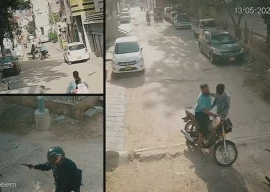
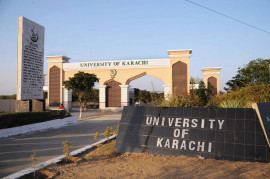
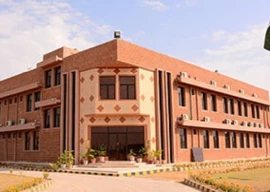


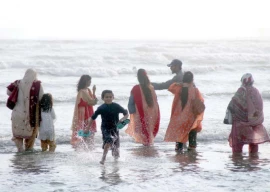

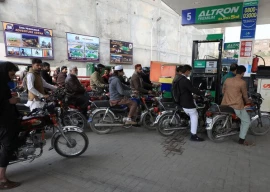
1715843823-0/WhatsApp-Image-2024-05-16-at-12-14-16-(1)1715843823-0-270x192.webp)
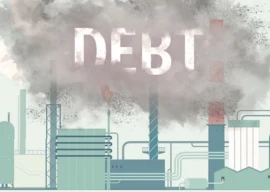

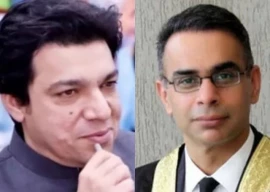






COMMENTS
Comments are moderated and generally will be posted if they are on-topic and not abusive.
For more information, please see our Comments FAQ